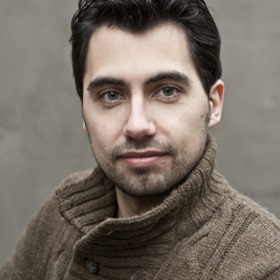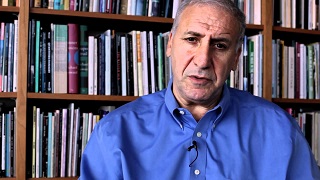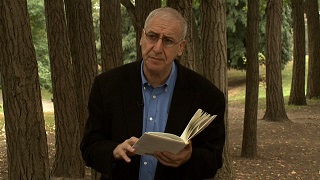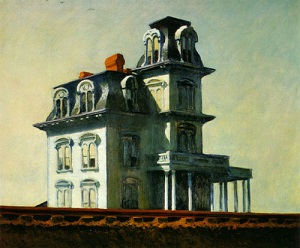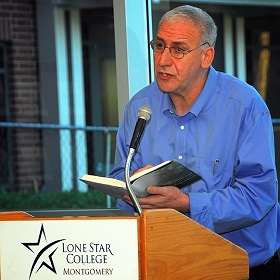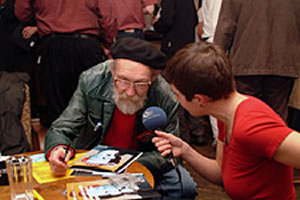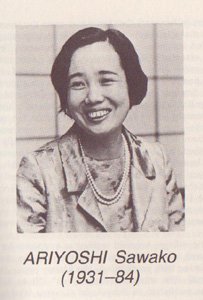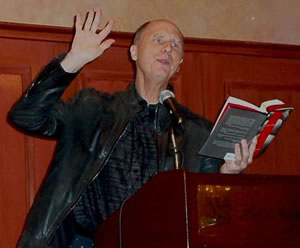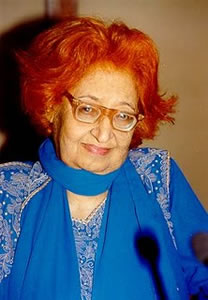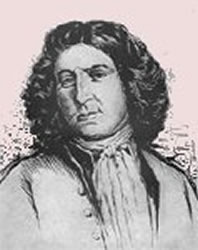De Nederlandse schrijver en journalist Stefan Popa werd op 20 januari 1989 geboren in Vleuten. Zie ook alle tags voor Stefan Popa op dit blog.
Uit: Verdwenen grenzen
“Remus voelde hun ogen prikken. Verlegen wierp hij zijn lange haren van de ene naar de andere schouder. Een oude man streek instemmend over zijn stoppels en stak een sigaret op.
‘Je haar is veel te lang’, bromde hij tegen Remus. ‘Dus kom verder.’
De stilte had slechts een lange seconde geduurd. Voor een Roemeen genoeg om de goeden van de slechten te onderscheiden, dacht Remus, terwijl hij naar de man knipoogde en naar de enige vrije statafel in de hoek liep. Hij liet een spoor van sneeuw achter op het vieze tapijt. Onderweg stopte hij bij de opening in de muur waarachter een forsgebouwde vrouw koperen koffiepannetjes in een bak met heet zand perste.
‘Een Turkse koffie’, zei Remus.
‘Iets anders hebben we niet’, antwoordde de vrouw.
Remus knikte en liep naar de tafel. Hij drukte een elleboog in het hout, liet zijn kin in zijn handpalm rusten en wachtte tot de vrouw zou roepen dat de koffie klaar was. Of misschien zou ze de koffie komen brengen.
‘Ik heb jou hier nooit eerder gezien’, zei de oude man, die hem ongemerkt was genaderd. Het donkergroene pak van de man was versleten en op diverse plekken waren gaten en scheuren gedicht met de verkeerde kleuren katoen.
‘Maar ik u wel’, antwoordde Remus. De man trok zijn wenkbrauwen op. ‘Ik werk iets verderop, bij de schoenherstellerij, en loop elke dag langs dit koffiehuis. Soms zie ik u staan. Ik heb wel eens een artikel van u gelezen in een tijdschrift.’
‘Dat moet oud werk zijn’, verzuchtte de man. Hij fluisterde: ‘De censoren zien in alles wat ik schrijf een aanval op het systeem.’
‘En is dat niet zo?’ Remus verslikte zich. Het was een bijzonder onvoorzichtige vraag.
De man haalde zijn knokige schouders op.”
.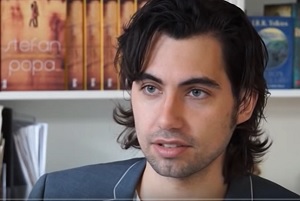
Stefan Popa (Vleuten, 20 januari 1989)
De Nederlandse dichter, schrijver en essayist Anton Ent (pseudoniem van Henk van der Ent) werd geboren in Rotterdam op 20 januari 1939. Zie ook alle tags voor Anton Ent op dit blog.
Overwintering aan zee
De elzen lopen uit. De weg van alle vlees
gegaan, dagelijks in godvergeten grijs.
De wind hield ik niet tegen. Stuifzand dit leven,
vliegend schuim. Het leek mij, versteende
vogel in regenpak, niet wijs op het glasloos
terras te blijven. De vrees voor strop en gas
joeg mij het strand langs. Ik wilde meeuw zijn
maar vogels sterven ook. Dit gaf zekerheid.
Dood als verbeelding. Wonder van elzeproppen.
Op het terras
Op het terras. Verschijnt een hagedis in het gras?
En weg! Ze wil niet weten welke soort
Iedere vorm van kennis scoort laag vandaag
Schaamte voor het verlangen naar anonieme
schoonheid een naakte man in de branding
Morgen verlaat ze dit eiland. Wat zij wilden
is voorbij. Duinen geven geen antwoord
het strand stuift, er staat een grijze zee
Over de boeg van de hoop. Ze vraagt benauwd:
hopen waarop? Dat de woorden niet liegen?
Minnaars elkaar niet bedriegen? Zelfmoord
en dood tot hetzelfde taalspel behoren?
De hoop dat het helder wordt zegt hij
Liever filmt ze een sneeuwjacht waarin
een man buiten adem voortgaat, duin op
duin af. Een hagedis in het gras. Is. Was.
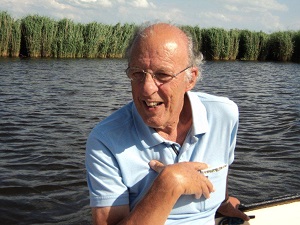
Anton Ent (Rotterdam, 20 januari 1939
De Amerikaanse dichter en letterkundige Edward Hirsch werd geboren op 20 januari 1950 in Chicago. Zie ook alle tags voor Edward Hirsch op dit blog.
Amour Honestus
The nights were long and cold and bittersweet,
And he made a song for the hell of it.
She stood by the window, a heavenly light
Who created havoc for the hell of it.
He used to fondle every skirt in sight,
Then he fell in love—that’s the hell of it.
Now there’s a courtyard with an abject knight
Yodeling his head off for the hell of it.
O poor me, my Lady, my hopeless plight!
She married a prince for the hell of it.
Honorable, unsatisfied, illicit—
Why bring it up? Just for the hell of it.
The fever spread from poet to poet
Who burned in the high-minded hell of it.
But the Untouchable had him by the throat,
And he stopped singing for the hell of it.
Love is a tower, a trance, a medieval pit.
When I lost you, I knew the hell of it.
Cotton Candy
We walked on the bridge over the Chicago River
for what turned out to be the last time,
and I ate cotton candy, that sugary air,
that sweet blue light spun out of nothingness.
It was just a moment, really, nothing more,
but I remember marveling at the sturdy cables
of the bridge that held us up
and threading my fingers through the long
and slender fingers of my grandfather,
an old man from the Old World
who long ago disappeared into the nether regions.
And I remember that eight-year-old boy
who had tasted the sweetness of air,
which still clings to my mouth
and disappears when I breathe.

Edward Hirsch (Chicago, 20 januari 1950)
De Duitse (Luxemburgse) schrijver Guy Helminger werd geboren op 20 januari 1963 in Esch-sur-Alzette. Zie ook alle tags voor Guy Helminger op dit blog.
Uit: Die Allee der Zähne. Aufzeichnungen und Fotos aus Iran
„Die Strohpuppe hat gebrannt, der Winter ist vertrieben und Karneval vorbei. Im Magazin der NZZ lese ich, dass in Iran auf Trunkenheit 80 Peitschenhiebe stehen. Da hätten wohl nur wenige Kölner die fünfte Jahreszeit überlebt.
Noch gestern hatte ein Bekannter mich gefragt: „Wohin willst du?“, mit Betonung auf der ersten Silbe, während sein Gesicht von unsichtbarer Hand zerknittert worden war. „Nach Teheran“, hatte ich geantwortet und er hatte den Kopf geschüttelt und ein Bier bestellt, das er mir mit den Worten „Vielleicht dein letztes“ über die Theke schob. Es war nicht mein letztes. Im Gegenteil, in der Metropole der Abstinenzler waren die Bars in jedem Haushalt so gut bestückt, dass ich ins Grübeln kam und irgendwann einen der Gastgeber fragte, wie er an all den Wodka, Whisky, Wein und an das Weißbier käme? Er dachte einen Moment lang nach, als habe er sich die Frage noch nie gestellt, ehe er antwortete: „Ich gehe davon aus, dass die Regierung den Schmuggel organisiert.“
****************
Es wackelt gewaltig zwei-, dreimal und der Mann rechts neben mir lacht sich brezelig. Ich weiß nicht, ob ihn das Ruckeln so amüsiert oder der iranische Film, der gezeigt wird. Jedenfalls ist er der Chef einer iranischen Fluggesellschaft, einer anderen Fluggesellschaft als der, mit der wir gerade fliegen, erklärt mir mein Sitznachbar zur Linken. Seine Frau sei bereits einmal mit einer dieser Maschinen geflogen und da sei das Fahrwerk beim Landen nicht ausgefahren. Also habe der Kapitän kurzerhand ohne die Passagiere zu informieren einige Flugmanöver vollzogen, die man durchaus als unkonventionell für einen Passagierflieger bezeichnen könne, die das Fahrwerk aber beim dritten Mal gelöst hätten, und man sei sicher gelandet. Er reicht mir seine Visitenkarte und stellt sich vor: Gohar L., Distributor Middle East für Inline-Skater. Sein Zopf schaukelt ihm ruhig im Nacken, während er erzählt, dass seine Firma eigentlich eine Präsentation haben sollte in Teheran, aber die Behörden würden das Ganze dauernd verschieben. Die iranischen Jugendlichen hingegen hätten Interesse am Inline-Skating, und wo so viel verboten würde, müsse man den Drang der Jugend nach Abwechslung unterstützen. Ihn haben seine Eltern bereits mit zwölf nach Deutschland auf ein Internat geschickt, damit er raus aus Teheran kam. Heute lebt seine ganze Familie in Deutschland.“
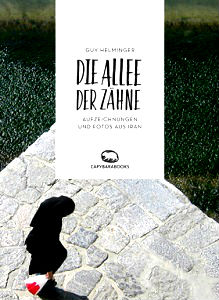
Guy Helminger (Esch-sur-Alzette, 20 januari 1963)
De Duitse schrijver André Kubiczek werd op 20 januari 1969 geboren in Potsdam. Zie ook alle tags voor André Kubiczek op dit blog.
Uit: Komm in den totgesagten Park und schau
„Jetzt wusste wenigstens ein einziger Mensch auf dieser ganzen Scheißwelt, was mit ihm los war, obwohl Veit Stark doch sehr bezweifelte, dass Marek Winter, sein Kollege und wenn auch vielleicht nicht gerade Freund, so doch immerhin nahestehendster Bekannter im real life, sich noch an all das erinnern konnte, was er ihm zu sehr später Stunde – die Morgendämmerung war bereits aufgezogen vor den getönten Fenstern des Leibarztes – anvertraut hatte. Nein, nicht anvertraut, eher gebeichtet hatte, musste man schon sagen. Zu sehr war Marek in jener Nacht mit seinen eigenen dummen Problemen beschäftigt gewesen, hatte meist nur stumm vor sich hin gebrütet, das zerschrammte Gesicht verzogen wie in Qualen, und dabei Runde um Runde Bier und Wodka in sich hineingeschüttet, die Veit nachorderte, ohne ihn zu fragen. In unregelmäßigen Abständen, die jedoch immer kleiner wurden, je mehr er trank, hatte Marek mit der weinerlichen Beharrlichkeit des Betrunkenen immer wieder dieselbe barmende Frage gestellt: Wie um alles in der Welt er seiner zweiten, brasilianischen Frau – mit diesem unglaublichen Hintern und dem schwer undeutschen Temperament, die Veit vor zwei Jahren einmal kennengelernt hatte, als er Marek besucht hatte, um sich ein Buch zu leihen, eine Zeit, zu der er noch nicht sein ganzes Testosteron im Internet verschleuderte, und allein bei ihrem Anblick, vom Druck ihrer Hand, dem Klang ihrer dunkel getönten Stimme eine spontane Erektion bekommen hatte wie irgendein blöder Teenager – , wie, um Himmels willen, er seiner Frau Adriana am schonendsten beibringen könne, dass das Jugendamt demnächst ihre gemeinsame Wohnung inspizieren würde, hatte sich Marek Winter in einer leiernden Dauerschleife wiederholt, während er immer tiefer in ein alkoholisches Wachkoma gesunken war. Eine paradoxe Daseinsart gleichzeitiger An- und Abwesenheit, die Veit, der ganz offensichtlich einiges mehr vertrug als sein Kollege, überhaupt erst ermutigt hatte, von seinem aktuellen und äußerst desaströsen Status quo zu berichten, von dem kein Mensch etwas ahnte, seine Eltern nicht und nicht seine Schwester, vermutlich auch nicht die Studenten des Einführungsseminars, das er gab, ein persönlicher Ausnahmezustand, in den Veit Stark sich im Laufe eines Jahres hineinmanövriert hatte, ohne sich dessen bewusst gewesen zu sein.“
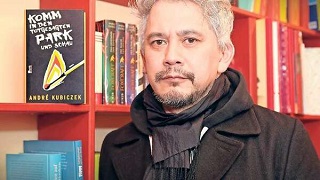
André Kubiczek (Potsdam, 20 januari 1969)
De Israëlische schrijfster, journaliste en literatuurwetenschapster Batya Gur werd geboren op 20 januari 1947 in Tel Aviv. Zie ook alle tags voor Batya Gur op dit blog.
Uit: Denn die Seele ist in deiner Hand (Vertaald door Barbara Linner)
“Es kommt der Punkt im Leben eines Menschen, an dem er klar erkennt: Wenn er jetzt nichts unternimmt, wenn er sich jetzt nicht über seine Bedenken hinwegsetzt und den Gefühlen freien
Lauf lässt, die er jahrelang unterdrückt hat – dann wird er es niemals tun. Diesen Gedanken sprach Inspektor Michael Ochajon nicht aus, aber er ging ihm durch den Kopf, als Balilati, der Leiter des polizeilichen Nachrichtendienstes, mit seinem Gemurre nicht mehr aufhören wollte, selbst als Michael sich bereits über die Leiche beugte. Er ging in die Hocke, um die ausgefransten Fasern des eingerissenen Seidenschals genauer zu betrachten, der um den Hals des Opfers geschlungen war. Vom Gesicht war nur noch eine zerschmetterte Masse aus Blut und Knochen übrig.
Ada Efrati hatte sie alarmiert und auf dem Treppenabsatz vor der Tür ihrer Eigentumswohnung auf sie gewartet. Unverzüglich hatte Balilati sie mit Fragen bestürmt, nur um sie am Ende wissen zu lassen, dass sie morgen noch ausführlicher von Inspektor Ochajon vernommen würde. Er bemerkte überhaupt nicht den verstörten Blick, den sie Michael zuwarf, als sie hinter Balilati die Außentreppe hinaufstieg, die zum zweiten und letzten Stockwerk des Gebäudes führte. Und schon da, als sie sie zum ersten Mal dort in der Dämmerung sahen, hatte Balilati sich zu Michael umgedreht und eine schnelle Einschätzung vorgenommen (»Ob sich bei der ein Versuch lohnt? Was meinst du?« Und sofort selbst die Antwort darauf gegeben: »Die ist ein harter Brocken, schöne Lippen hat sie, aber siehst du die zwei Furchen neben dem Mund? Die sagen: Null Interesse. Aber hast du ihre Figur gesehen? Und was für Nerven sie hat? Wie Drahtseile. Wir haben Leute schon ganz anders angetroffen, wenn sie eine Leiche gefunden haben, aber die, schau dir bloß mal an, wie sie dasteht«.)“
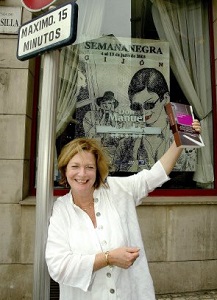
Batya Gur (20 januari 1947 – 19 mei 2005)
De Turkse schrijver Nazim Hikmet werd op 20 januari 1902 geboren in Thessaloniki. Zie ook alle tags voor Nazim Hikmet op dit blog.
The Japanese Fisherman
„Jetzt wusste wenigstens ein einziger Mensch auf dieser ganzen Scheißwelt, was mit ihm los war, obwohl Veit Stark doch sehr bezweifelte, dass Marek Winter, sein Kollege und wenn auch vielleicht nicht gerade Freund, so doch immerhin nahestehendster Bekannter im real life, sich noch an all das erinnern konnte, was er ihm zu sehr später Stunde – die Morgendämmerung war bereits aufgezogen vor den getönten Fenstern des Leibarztes – anvertraut hatte. Nein, nicht anvertraut, eher gebeichtet hatte, musste man schon sagen. Zu sehr war Marek in jener Nacht mit seinen eigenen dummen Problemen beschäftigt gewesen, hatte meist nur stumm vor sich hin gebrütet, das zerschrammte Gesicht verzogen wie in Qualen, und dabei Runde um Runde Bier und Wodka in sich hineingeschüttet, die Veit nachorderte, ohne ihn zu fragen. In unregelmäßigen Abständen, die jedoch immer kleiner wurden, je mehr er trank, hatte Marek mit der weinerlichen Beharrlichkeit des Betrunkenen immer wieder dieselbe barmende Frage gestellt: Wie um alles in der Welt er seiner zweiten, brasilianischen Frau – mit diesem unglaublichen Hintern und dem schwer undeutschen Temperament, die Veit vor zwei Jahren einmal kennengelernt hatte, als er Marek besucht hatte, um sich ein Buch zu leihen, eine Zeit, zu der er noch nicht sein ganzes Testosteron im Internet verschleuderte, und allein bei ihrem Anblick, vom Druck ihrer Hand, dem Klang ihrer dunkel getönten Stimme eine spontane Erektion bekommen hatte wie irgendein blöder Teenager – , wie, um Himmels willen, er seiner Frau Adriana am schonendsten beibringen könne, dass das Jugendamt demnächst ihre gemeinsame Wohnung inspizieren würde, hatte sich Marek Winter in einer leiernden Dauerschleife wiederholt, während er immer tiefer in ein alkoholisches Wachkoma gesunken war. Eine paradoxe Daseinsart gleichzeitiger An- und Abwesenheit, die Veit, der ganz offensichtlich einiges mehr vertrug als sein Kollege, überhaupt erst ermutigt hatte, von seinem aktuellen und äußerst desaströsen Status quo zu berichten, von dem kein Mensch etwas ahnte, seine Eltern nicht und nicht seine Schwester, vermutlich auch nicht die Studenten des Einführungsseminars, das er gab, ein persönlicher Ausnahmezustand, in den Veit Stark sich im Laufe eines Jahres hineinmanövriert hatte, ohne sich dessen bewusst gewesen zu sein.“
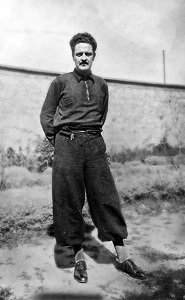
Nazim Hikmet (20 januari 1902 – 3 juni 1963)
De Indiaase schrijfster Qurratulain Hyder werd geboren op 20 januari 1927 in Aligarh, Uttar Pradesh. Zie ook alle tags voor Qurratulain Hyder op dit blog.
Uit: A Season of Betrayals (The Sound of Falling Leaves)
“She replied that she was looking for an in-law’s house—that’s how she happened to wander into my lane—and promised to come later. Then, right there in the middle of the alley, she told me about each and every one of our college friends. Salima married a Brigadier; she now had four children. Farkhunda’s husband was in the Foreign Service; her eldest daughter was in a school in London. Rehana was now the Principal of a college. Sa’diya had been to the States where she picked up a whole bunch of degrees; now she had some topnotch job in Karachi. This girl even knew about our old Hindu friends. Prabha’s hus-band was a Commodore in the Indian Navy; they were living in Bombay. Sarla was now a Station Director with the All India Radio, currently posted somewhere in South India. Latika had made a name for herself as a painter in New Delhi. She chattered on, but I couldn’t forget that first look of horror in her eyes. Then she said, “Whenever some of us get together in Karachi we always think of you.” “Really!” I laughed, but it sounded hollow. I know what words they must have used to remember me by, those witches. Friends, indeed! To tell you the truth, women are their own worst enemy. She didn’t even bother to ask me what I was doing in that wretched alley, at the back door of a decrepit house—she already knew. Women have an intelligence service of their own—it can put even Interpol to shame. Not that I have ever tried to hide any-thing. I’m insignificant, not worth much talking about. Nobody gives a damn for me. Neither do I.
The Sound of Falling Leaves .4 5 I’m Tanvir Fatima. My father, who lived in Meerut, was a zamindar, though not big. Our family observed strict purdah; I was kept in seclusion even from my cousins. But as my parents’ only daughter I was their darling. they pam-pered me beyond measure. I did well at the local se hof f I and won a few awards, so my parents sent me all the way to Delhi, to St. Mary’s, to matriculate. From there I went to Aligarh. That was the best time in my life, those four years at Aligarh Muslim Girls’ College. What a dream of a place! I’m not sentimental, but the memory of it still lingers. The large, enclosed yard of the college; the brick-lined paths; the lush grass; the patter of raindrops on the trees; the annual fair in the city where all the girls from the col-lege would run around covered from head to toe in black burqas; the narrow verandahs of the hostel; the tiny rooms which had such an air of domesticity about them—it al-most breaks my heart when I think of that place. I returned to Delhi, to do my M.Sc. There at the college I met all those girls—Rehana, Prabha, the rest. I’ve never much liked girls. In fact, I don’t like most people.”
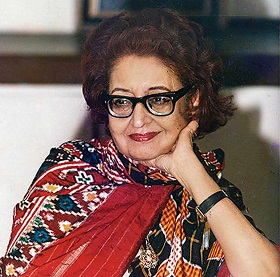
Qurratulain Hyder (20 januari 1927 – 21 augustus 2007)
De Amerikaanse schrijver Robert Olen Butler Jr. Werd geboren op 20 januari 1945 in Granite City, Illinois. Zie ook alle tags voor Robert Olen Butler Jr. op dit blog.
Uit: Paris in the Dark
“From off to the west the air cracked. The sound brass-knuckled us and faded away.
A bomb. Awful big or very near.
All around me the shadows of men had risen up and were retreating into the bar. They had the Zepps in mind. I jumped up too but stepped out onto the pavement of Boulevard Montparnasse.
It wasn’t Zepps. I’d have heard their engines. And the crack and fade were distinctive. Dynamite. This was a hand-delivered explosive. I looked west. Five hundred yards along the boulevard I could make out a billow of smoke glowing piss-yellow in the dark.
I made off in that direction at a swift jog.
My footfalls rang loud. As I neared, there were sounds. Battlefield sounds just after an engagement. The silence of ceased weapon fire filled with the afterclap of moaning, of gasping babble.
The police were wading into the bomb site now. I took a step off the island and onto the cobbles. My foot nudged something and I stopped again. I looked down.
A man’s naked arm, severed at the elbow, its hand with palm turned upward, its fingers splayed in the direction of the café, as if it were the master of ceremonies to this production of the Grand Guignol. Mesdames et messieurs, je vous présente la Grande Guerre. The goddamn Great War.
I lifted my eyes once more to the Café Terminus. Not one detail I was witnessing-not a bistro table in the middle of Boulevard Montparnasse, not the severed arm at my feet-Would ever make it past the news censor’s knife.”
(…)
She followed my scar with her eyes, slowly, from near her fingertips, up my cheek, to the point where a German’s saber in the camp of a Mexican rebel had begun its slice.
“Are you sure you have no more of these?”
“How can I convince you?” I said.
I didn’t myself fully understand what I was suggesting until she gave me that complex look a woman can sometimes give, when you faintly shock and offend her, even as you compliment her and intrigue her, even as you move her to the possibility of the ultimate suffrage, a woman’s right to elect to express love, or even simply desire, on her own terms.
Now I realized what I had asked. Of course I had.”
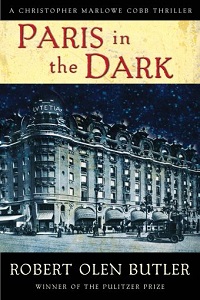
Robert Olen Butler Jr. (Granite City, 20 januari 1945)
Cover
Zie voor nog meer schrijvers van de 17e januari ook mijn vorige blog van vandaag.

